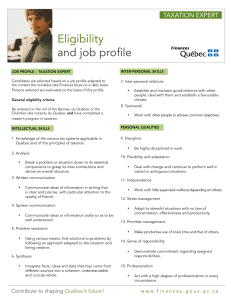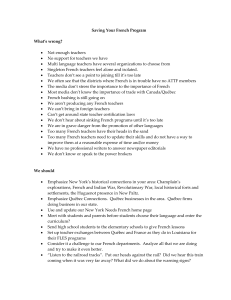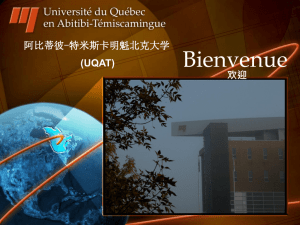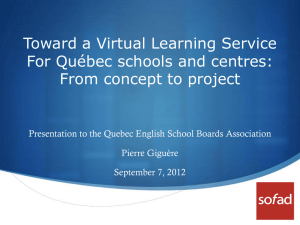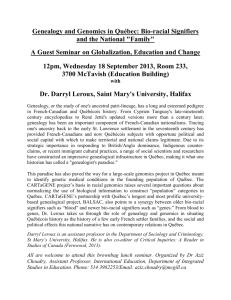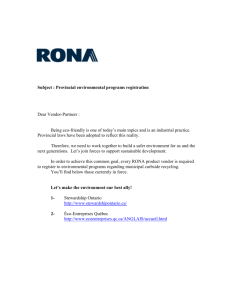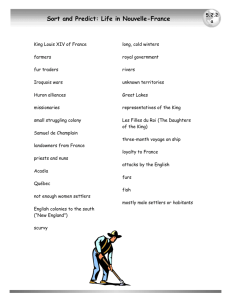Le Québec - Public Policy Forum
advertisement
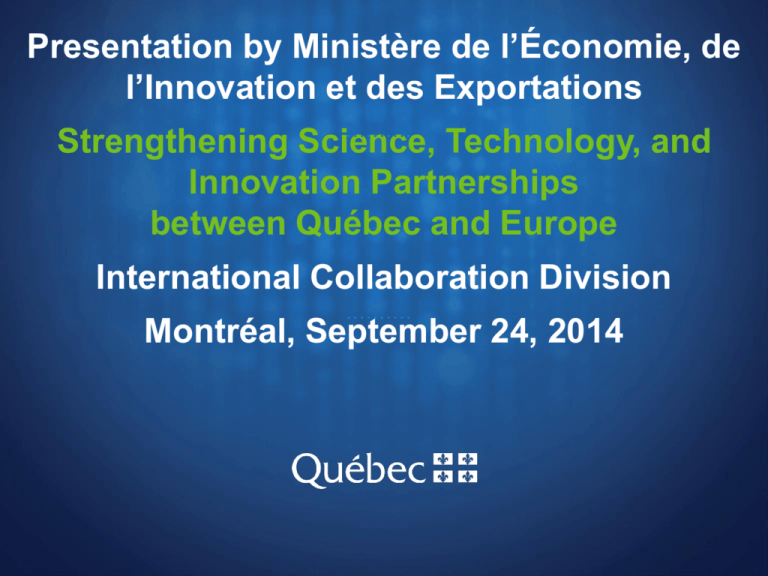
Presentation by Ministère de l’Économie, de l’Innovation et des Exportations Strengthening Science, Technology, and Innovation Partnerships between Québec and Europe International Collaboration Division Montréal, September 24, 2014 Proposed Agenda • General overview of Québec – Research and innovation • Mandate of the International Collaboration Division • Our existing collaborations with Europe • Opportunities on the Québec side • Potential new collaborations General Overview of the Province of Québec • • GDP: $358 billion (20% of Canada’s GDP) NAFTA: Access to a market of 460 million consumers General Overview of the Province of Québec An economy focused on innovation • Life sciences (biotechnology, personalized health care, biofood) • Aeronautics • Green technologies • ICT and creative industries • Renewable energy and transportation electrification Research and Innovation in Québec • Québec’s assets: A substantial university and college network covering almost the entire province Strong and competitive international clusters A vibrant international culture A political commitment to invest in research and innovation in the coming years • In 2012, Québec had the most intensive R-D in Canada with total expenses in terms of GDP of 2,28%, (Canadian average = 1,73 %; OECD = 2,40%). • Québec had 42,800 researchers, or 10 per 1,000 of the active population, the highest ratio in Canada. • A unique position in Canada: Québec Chief Scientist General Overview of the Province of Québec 1- Bishop’s University 9- UQAM 2- Concordia University 10- UQTR 3- Université Laval 11- UQAC 4- McGill University 12- UQAR 5- Université de Montréal 6- HEC Montréal 7- École Polytechnique de Montréal 8- Université de Sherbrooke 13- UQO 14- UQAT 15- INRS 16- ÉNAP 17- ÉTS 18- TÉLUQ Québec Innovation Chain What We Do New minister since April 24: Jacques Daoust Promote Québec’s participation (including institutional and industry partners) in international projects and networks in the fields of research and innovation by supporting the implementation of activities and strategic alliances. Initiatives may take the form of international agreements, programs, foreign missions, and the hosting of international delegations with a view to facilitating targeted matchmaking with potential partners. The International Collaboration Division also promotes Government of Québec representation in international forums. Examples of Past Activities • May 2011: Canada-EU Innovation Forum • May 2011: Visit by Ana Arana Antelo, Directorate General for Research & Innovation, European Commission • March 2012: Eureka European delegation • July 2013: Visit by André Syrota, CEO of INSERM • November 2013: Visit by Eurogia • January 2014: Passport for Partnerships: Linking Québec and Europe in Research and Innovation • September 2014: Visit by Máire Geoghegan-Quinn, European Commissioner for Research, Innovation and Science Since 2011: Québec participation in the Canada-EU Joint Committee on S-T (JSTCC) PROGRAMS TO WATCH IF YOU WANT TO COLLABORATE WITH QUÉBEC Research Assistance Program: Assistance for International Research and Innovation Initiatives Component (PSR-SIIRI) Goals of PSR-SIIRI Increase the number of high-level international research and innovation partnerships in strategic and priority areas for Québec Foster the participation of strategic groups, Québec centers of excellence, and businesses within large international networks and R&D consortiums 11 Research Assistance Program: Assistance for International Research and Innovation Initiatives Component (PSR-SIIRI) Types of projects 12 Joint projects Bilateral and multilateral Major projects - International networks (four foreign partners and more) - Large-scale joint projects (7th European Framework Program, Horizon 2020) Specific calls for proposals (government commitments, themes) Research Assistance Program: Assistance for International Research and Innovation Initiatives Component (PSR-SIIRI) Target clienteles Researchers associated with businesses* and nonprofit organizations active in all aspects of scientific and technological research, innovation, and transfer and with public research facilities, health and education networks. *Priority is given to those with less than 250 employees. Calls for proposals to be confirmed. For more information click here: PSR-SIIRI 13 Québec and European Partners Share Strong Ties • At the Canadian level, Québec receives 30% of EC funding to Canada (ranked 2nd after Ontario). • Our division offers 50% co-funding via PSR-SIIRI to Québec researchers for their participation at FP7. • Since 2007, 23 FP7 projects have been funded for a total of $13.7 million. = total budget of these projects is $36 million to be spent in Québec - more than $156 million from international contributions Québec and European Partners Share Strong Ties • We have funded bilateral and multilateral projects Partner country Participating projects (outside FP7) that include France 105 European partners. Italy 35 Germany 33 • Since 2007, 169 projects Belgium 29 funded for a total of 14,4 M$ United Kingdom 27 from the Ministry. Spain 16 Denmark 11 • These included joint Netherlands 9 research projects, strategic Sweden 6 Switzerland 5 networking, and project building initiatives. Québec Tax Holiday for Researchers and Experts Eligibility for employers: Basically private sector Any employer operating a business in Québec and conducting science research and experimental research is eligible. Exceptions: • Any municipality or public body performing government functions. • Any company with at least 90% of its shares, capital, or assets held by a government or municipality in Québec. • Any university or public research center. Financial Assistance • Provincial tax holiday. The direct beneficiary is the foreign employee. • This tax holiday is for a maximum of 60 consecutive months and applies to the salary received by the foreign researcher: – 100% of taxable income the first two years – 75% the third year – 50% the fourth year – 25% the fifth year Tax Holiday for Foreign Experts and Researchers • Since 2007, 109 experts and 352 researchers have been admitted. • For both categories, areas of expertise are ICT, aeronautics, pharmaceuticals, and biotechnology. • Beneficiaries are mostly from France, the UK, and Germany. For more information click here: Tax holiday Tax Holiday for Precompetitive Research Projects in Private Partnership For R&D partnerships between a minimum of 2 companies The project must meet two objectives: • Hold a partnership agreement • Conduct precompetitive research A foreign company can be a partner in these projects. For more information click here: Precompetitive Québec Research Fund in Nature and Technologies • FRQNT is now a member of CHIST-ERA (European Coordinated Research on Long-term Challenges in Information and Communication Sciences & Technologies, ERA-Net). • This membership allows Québec researchers to present projects with their international partners. Québec Research Fund in Nature and Technologies Two thematic priorities: • Resilient and Trustworthy Cyber-Physical Systems • Human Language Understanding FRQNT will be funding two projects. The call will be launched in October 2014. For more information on the call: http://www.chistera.eu/topics-keywordschist-era-conference-2014 Contact on the Québec side: Guillaume Lamontagne Email: guillaume.lamontagne@frq.gouv.qc.ca Telephone: 1-418-643-8560, ext. 3455 Aerospace Collaboration Opportunities Consortium for Research and Innovation in Aerospace in Québec (CRIAQ) • International collaborations - Require at least two Canadian enterprises, and one foreign. • Intellectual property matters are managed between partners. $107.6 million total for ongoing & completed projects 55+ 25+ industrial members 20+ academic members 600+ p. 23 international collaborators researchers and industrial specialists Collaborations with Europe Continued relations with Europe since CRIAQ’s creation in 2002 (missions, MOU, agreement) Successful projects: A collaborative model based on business agreements between companies and/or student exchange (& co-supervision) between research institutions p. 24 NEW Consortium for Aerospace Research and Innovation in Canada (CARIC) Launched in April 2014 Operational model based on CRIAQ recognized as a best practice for collaborative research in Canada Industry-driven with strong academic presence and collaboration Mandated to manage the first EU-Canada coordinated call in aeronautics 2015 EU-Canada Coordinated Call for Research Projects in Aeronautics Ongoing opportunity 1st call in coordination with the European Commission • Funding available for 3–4 projects (total project budget around €3 million: Canadian and European activities combined) • A partnership of a minimum of 7 partners: 4 from Canada (2 academics & 2 industries) 3 from Europe • Deadline for submission: April, 23, 2015, on both sides For more info on the Canadian side please subscribe to CARIC's newletter at www.caric.ca/ • Success rate: twice the average for H2020 Research and Innovation Actions 2015 EU-Canada Coordinated Call for Research Projects in Aeronautics Topic-oriented call: • Reducing environmental impact through advanced design of novel aircraft configurations • Reducing noise through novel materials design and application on engines and/or airframes • Resource-efficient, high-performance, advancedmaterials product development and manufacturing • Reducing energy consumption through more electrical aircraft and systems integration More info on this call (European side) at http://ec.europa.eu/research/participants/portal/desktop/en/opportunities/h2020/topics/9059mg-1.9-2015.html BLUE GROWTH FOCUS AREA WP 2014-2015 Trans-Atlantic Ocean Research Alliance Status: Political statement advanced jointly by all three parties: • • • Utilizing existing bilateral science and technology cooperation agreements and multilateral cooperation frameworks, Recommending priorities for future cooperation, and, where possible, Coordinating the planning and programming of relevant activities in these areas. Goal: Better understand the Atlantic Ocean and promote the sustainable management of its resources. The work will also study the interplay of the Atlantic Ocean with the Arctic Ocean, particularly with regard to climate change. In Work Program 2014–2015: Several topics are identified as relevant for implementation of the Galway Statement: • Involvement of US and Canadian entities strongly encouraged https://www.marine.ie/home/aboutus/newsroom/pressreleases/EUUSCanadalaunchAtlant icOceanresearchallianceinGalway.htm Our Priorities with Europe • Facilitate the dissemination of opportunities for collaboration with Europe to the research and innovation community in Québec. • Offer direct co-funding for international research projects involving European partners and work with partners to extend our offer to researchers and companies. • Organize outward and inward missions and contribute to the creation of strategic partnerships. CONTACTS For questions Hasna Rouighi Email: hasna.rouighi@mesrs.gouv.qc.ca Tel.: 514-873-1767, ext.6910 Inji Yaghmour Email: Inji.yaghmour@mesrs.gouv.qc.ca Tel.: 514-873-1767, ext.6971 Questions/Comments •… Thank you! MERCI! Visit our website: www.economie.gouv.qc.ca
